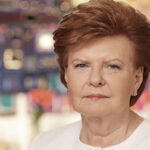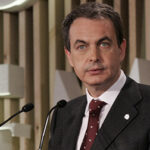The Secretary-General of World Leadership Alliance – Club de Madrid, María Elena Agüero, kicked off the debate on the Fall of the Berlin Wall. SG Agüero considered that “some things we haven’t learned or we haven’t paid enough attention to the issues” in regard to the number of walls that still exist today.
“Many of the values that we optimistically and enthusiastically embraced in 89 after the Fall of the Wall are today seriously under threat, even in countries that were championing them for decades”, added Agüero.
Despite all challenges ahead, the Secretary-General of WLA-CdM was confident that the organization can make a contribution “in advocating and fostering the values of freedom, liberty, human rights, and democracy so that a more constructive reaction can come”.
“Not all walls are eternal”, said Vaira Vike-Freiberga, President of WLA-CdM to launch an intervention that celebrated freedom and individuality in front of systems -like the USSR- that force people into obedience. The former President of Latvia, who had to flee her country under Soviet occupation at age 6, noted how the Berlin Wall was a rarity: “It was not to protect you from outside attack, which most walls are built for”, rather “they wanted to prevent their people from escaping the worker’s paradise”.
“It should be obvious that if they want to build a country people should contribute to it, and not be reminded by signs on the wall”, added the President of the WLA-CdM.
Vaira Vike-Freiberga sent a message of hope to all people desperate who might be staring at a wall today: “When there is a will and when the consciousness of a sufficient number of people, the awareness of a possibility of an alternative, a vision of a different way of living, thinking and being has penetrated a critical mass of the population, then it does become possible to change things”.
Rejecting systems that instil obedience into the cult of a personality (Stalinism) or into a state, like totalitarianism, Vike-Freiberga strongly defended access to thoughts that allow people to be free and think of each other as equal human beings.
“Only careful nurturing and a careful upbringing can remedy the tendency to hate and the tendency to have suspicion or to be jealous. Poets have said it much better, about ‘the better angels of our nature’ that we should be working towards, instead of negative feelings. This is why civilization and education are necessary”, said the President of WLA-CdM
Watch Vaira Vike-Freiberga’s intervention by clicking below
WLA-CdM Members discuss the future of the EU and the Venezuelan crisis
Member José Luis Rodírguez Zapatero joined former President of the European Commission, José Manuel Durao Barroso in the panel “Lessons from the Past” to reflect on the European Union’s position in the international scene.
Commenting on the recent European elections, Member Zapatero called upon defending European values like the enlighted reason, democracy, pluralism, integration, migration and an open vision of the world, which should guide Europe’s place among other continents. “We cannot doubt our own European values”, said the former President of the Government of Spain.
“In such a globalized world, with swift technological change and Asia gaining ground, it is only normal to have a union of European countries, that are relevant and influential in 5G, Big Data, space and much more”, said Zapatero defending, together with Barroso, European unity.
Watch José Luis Rodríguez Zapateo’s intervention by clicking below
In the panel “Socialism of the 21st Century: Lessons from Latin America”, Member Jorge Quiroga kicked off the debate by reminding the audience at Estoril Conferences that this sort of socialism has its origins in Venezuela, a country “with a great historical significance”.
He considered, therefore, that “whatever happens in Venezuela, Nicaragua and Bolivia this next few months will determine if in Latina America we have freedom and sovereignty or authoritarian tendencies”.
On the period when Venezuela was led by Hugo Chávez, the former President of Bolivia considered that it is easy to be a socialist with high oil prices. The price drop coincided with the transition from Chávez to Maduro and since then, Venezuela has taken a turn for the worse.
“The international community need to create a united front to help and rescue Venezuela”, said Jorge Quiroga, who considers that Maduro’s government benefits from too many approaches from the international community to the Venezuelan crisis. In this regard, the former President of Bolivia celebrated that official international funding mechanisms are being passed to the President of the General Assembly and Interim Executive President, Juan Guaidó.
Watch Jorge Quiroga’s intervention by clicking below


